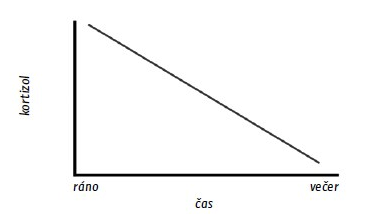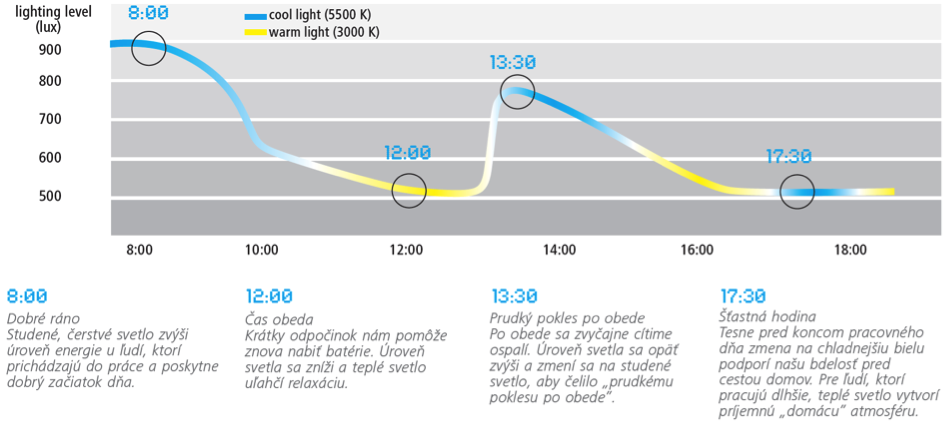Natural body biorhythms and hormone production
Circadian rhythms are natural body biorhythms that display an oscillation in an interval. The interval is a day (24-hours), and a sleep/wake rotation can serve as an example of the rhythm. Circadian rhythms are endogenous, but they are highly influenced by exogenous (external) factors, e.g. light (e.g. serotonin, melatonin, and cortisol production). Circadian rhythms can be interrelated, e.g. melatonin production affects the proper functionality of the sleep/wake circadian rhythm.
Influence of daylight on human body
Various studies have proven the circadian rhythm malfunctions may result in mood swings, may affect the behaviour and overall mental state. There are various factors that affect the circadian rhythms. There are endogenous (internal) factors – from inside the body (such as stress, or diet) and the exogenous (external) factors driven by the environment (natural daylight level, convenient artificial light within the proper spectrum range).
Thus, your central circadian clock is “set” everyday according to the light level and e.g. your diet. The circadian clock then serves as “a master clock” for all the body organs that set their own “clocks” accordingly.
Importance of the hormones for your body and health
Serotonin – find the happiness
Serotonin is derived from an amino acid called tryptophan. Serotonin is responsible for our well-being, optimistic thoughts and bellyful. Thanks to serotonin, you can enjoy positive emotions and good humour. It plays an important role in your everyday mood. If the serotonin level in your body is low, you can become stressed, depressed, anxious, more sensitive to a pain, or have some memory difficulties. Serotonin production is highly influenced by light level changes during the day. Unbalanced serotonin production may also cause indigestion (stomach ache, constipation, etc.). Serotonin also plays an important role when it comes to blood coagulation. Insufficient serotonin secretion can result in migraines.
Given the fact the serotonin production is highly affected by light levels during the day, serotonin deficiency may occur during the wintertime, when there is not enough daylight. This may cause anxiety and depressions during the winter months.
How to guarantee a proper serotonin production?
There are few ways how to affect the serotonin levels in your body – proper diet, convenient light levels in your house and office, exercising and spending more time in the sun. Sunshine gives serotonin production a boost. Exercising boosts up the neurotransmitters production and helps to fight the depression.
Melatonin – sleep tight
When it’s getting dark, serotonin turns into another hormone, melatonin. The higher the serotonin concentration in your brain, the more melatonin would be produced. Melatonin is produced during the night. Its concentration in the body reaches a peak at about three o´clock. Melatonin makes you sleep tight and have sweet dreams.
Read about the melatonin and how it affects human body
Cortisol – activity, motion and stress
Human body produces the cortisol in the morning. Its concentration in the blood reaches a peak at about 9 o´clock and decreases continually during the day. There are various factors that affect the cortisol production:
- Stress and stressing situations,
- A serious trauma (loss of job, money issues, death of a close person),
- Caffeine,
- Lack of sleep,
- Unfit lighting conditions, etc.
A study carried out by National Research Council of Canada proved that the white light could increase the production of cortisol. The study proved the cortisol level raised after the subject had been exposed regularly to the white light during 14 days.
If the cortisol level in the body is not right, various problems may occur: obesity, depressions, ulcers, cardiovascular difficulties, and immune deficiency, impotence, miscarriages, sterility and memory damage. Naturally, the cortisol is produced if the stressing situation occurs, and it helps to establish the homoeostasis – the proper functionality of the body after a defence or an attack. Anyway, long term cortisol secretion, e.g. due to chronic stress, will cause significant physiological changes.
Cortisol level changes during the day
Fig. Regular cortisol levels in the blood: high level in the morning, low level in the evening (source: www.cez-okno.net)
Fig. Cortisol levels if the subject is tired and tense: low level in the morning, high level in the evening (source: www.cez-okno.net)
How to optimize the cortisol level?
- Avoid stressing situation,
- Take in enough Vitamin C, drink black tea and eat ginseng,
- Supplement your diet with magnesium and Omega 3,
- Adjust your biorhythm,
- Adjust the light, etc.
How does the light impact your biorhythm and hormone production?
Directing a proper part of the blue spectrum range straight to the eye can modify the human activity and the biorhythm. Thus, technological parameters are not the only important feature of today´s lighting systems – biological effects on human body and mental and visual well-being are getting more and more important.
Daylight availability
Scientific research proved that natural daylight critically and positively affects our mental and visual well-being. Thus, the daylight is an extremely desired element in the places where we spend most of the day. If there is not enough daylight in the place, desired light level can be reached by using artificial light sources. The artificial light sources can also help in the place with no daylight at all. As the daylight is so important for our well-being, it is extremely important to make use of it as much as possible, and adjust the artificial light parameters accordingly, so the two light types match perfectly.
A fact that natural daylight is not monotonous and changes during the daytime, depending on cloudiness and season, becomes the main starting point when setting the light conditions in your home or office. Modern lighting solutions give us an option to set the light intensity and chromaticity accordingly.
Blue spectrum range
If the light conditions are set properly, one´s performance, work environment, disease symptoms, and even seasonal depressions can be positively affected. Due to the latest findings and modern technology, the proper light levels can also affect human circadian rhythm. The scientists were able to prove this true thanks to the recent discovery of third human eye photoreceptor type – sensitive to blue spectrum range – wavelength of approx. 464 nm. Producers working in the lighting industry appreciated the new finding and made it a starting point for a new light type – biologically active light that can positively affect human activity and biorhythm by directing a proper part of the blue spectrum range straight to the eye.
Daylight simulation by visible spectrum
Fig. Daylight simulation (source: OMS Lighting)
Source:
- OMS Lighting, ELITE (2013)
- http://en.wikipedia.org/wiki/Cortisol
- http://www.cez-okno.net/clanok/stres-a-kortizol-alebo-preco-by-sa-tato-kniha-mala-volat-vyspite-sa-doruzova-2, (2014)
- Ing. Antonín Fuksa, http://www.odbornecasopisy.cz/svetlo-a-biologicke-hodiny-42567.html (2010)
- http://sk.265health.com/conditions-treatments/headaches/1011017148.html
- http://www.1sg.sk/www/data/01/projekty/2010_2011/neptunes/spanok/cirkadiannerytmy.html (2010)




